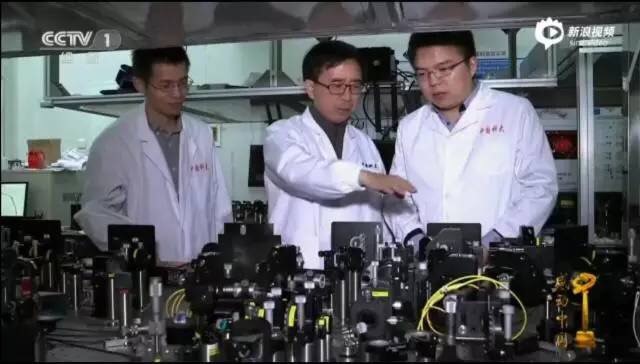China’s ‘Father of Quantum’ Elected Fellow of Royal Society

Insider Brief
- Pan Jianwei has been elected a fellow of the Royal Society in London.
- Pan is often referred to as China’s “father of quantum” and is co-founder of QuantumCTek.
- The announcement comes at a politically sensitive time when the US and the West cracking down on quantum exports to China, including QuantumCTek.
- Image: Pan Jianwei, center, with collaborators on CCTV via USTC
PRESS RELEASE — Pan Jianwei, a prominent physicist known as China’s “father of quantum,” has been elected one of the new fellows Royal Society in London. This honor comes amid recent US sanctions targeting the core of Chinese quantum technology.
Pan, who serves as a professor of modern physics and executive vice-president at the University of Science and Technology of China (USTC), has been recognized for his significant contributions to quantum science, particularly in multi-particle interferometry and space-based quantum experiments. His work includes leading the launch of Micius in 2016, the world’s first quantum science satellite, which aimed to establish a secure communication link between China and Europe.
A total of 90 researchers from across the world have been elected to UK’s national academy of sciences this year.
“I am pleased to welcome such an outstanding group into the Fellowship of the Royal Society,” said Sir Adrian Smith, President of the Royal Society. “This new cohort have already made significant contributions to our understanding of the world around us and continue to push the boundaries of possibility in academic research and industry. From visualising the sharp rise in global temperatures since the industrial revolution to leading the response to the Covid-19 pandemic, their diverse range of expertise is furthering human understanding and helping to address some of our greatest challenges. It is an honour to have them join the Fellowship.”
However, the honor comes at a somewhat awkward political time. Just a week ago, the US Commerce Department’s updated its export control list, adding 22 Chinese quantum research companies and organizations among the 37 Chinese “entities” targeted.
In fact, Pan is a co-founder of QuantumCtek, which was added to the control list.
Pan And USTC Advances
Pan’s team at USTC has been praised for their work in secure quantum communication, addressing major technological vulnerabilities to make the technology more practical and effective under realistic conditions, reports the South China Morning Post. These contributions have been published in leading academic journals and by international science communities.
Pan received his doctorate from the University of Vienna in Austria, where he studied under Nobel prize winning physicist Anton Zeilinger.
His election as a fellow of the Royal Society, an institution founded in 1660 and the world’s oldest continuous scientific academy, underscores his global standing in the field of quantum physics. This recognition aligns with USTC’s reputation as a center of quantum research and innovation, further supported by a vibrant local ecosystem conducive to technology startups and research advancements.
Pan’s influence extends beyond academic circles, SCMP reports. He is also an academician of the Chinese Academy of Sciences and director of the CAS Centre for Excellence in Quantum Information and Quantum Physics in Anhui province. His leadership in quantum computational technology has demonstrated the practical superiority of quantum systems over classical computers in certain applications.
